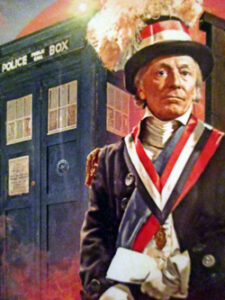The Reign of Terror
“Friends warn us, and friends denounce us.” – Rouvray
 This story starts off with a bit of misstep in characterization, the Doctor suddenly back to acting as the peevish old man ready to throw Ian and Barbara off the ship until they can coax and manipulate his ego, ignoring several stories of growth in their relationship. This is soon righted, however, and we move on to a rather straightforward historical story with the crew stranded in Revolutionary France—a dangerous time to be wandering about as they soon learn.
This story starts off with a bit of misstep in characterization, the Doctor suddenly back to acting as the peevish old man ready to throw Ian and Barbara off the ship until they can coax and manipulate his ego, ignoring several stories of growth in their relationship. This is soon righted, however, and we move on to a rather straightforward historical story with the crew stranded in Revolutionary France—a dangerous time to be wandering about as they soon learn.
We first meet a couple of fellows we think out group will fall in league with but they come to a swift end. The story doesn’t pull punches about brutality at this point—the one man seems awfully cowardly until he tells a bit of his story and you realize he’s actually traumatized (his whole family including his little sister were dragged off and executed) and soon after we hear him (off camera) being shot for sport after capture. The French peasants are painted as a crude lot, coughing and cackling and bloodthirsty. Every step the rest of the way leaves us wondering who is going to betray whom or be threatened with execution next.
Dennis Spooner is known for injecting comedy in his Doctor Who episodes, so there are some light moments with the Doctor wandering the countryside meeting and outwitting a buffoonish character. (Funny to hear him dubbed pejoratively as “Skinny”!) But the silliness and jaunty music doesn’t quite fit the tone of the story overall. His manipulation of the equally clownish jailer works a bit better—you almost feel sorry for the poor fellow. The Doctor’s acquisition of the regalia of a provincial official and carrying himself off as such—to the point of meeting Robespierre–works well because it shows the force of the Doctor’s personality and how he makes it through just on his confidence and quick thinking. (We also get a great throwaway line in Lemaitre’s wry reply to the Doctor’s complaint about Robespierre: “I didn’t say half the things I wanted to say. He twisted my words.” “Politicians usually do.”)
Most of the story consists of our group being dragged through prisons, rescues, and various associations all just in an attempt to meet up with each other again and get to the TARDIS. The only real surprise is the identify of John Sterling, the mysterious key ally actually being the very man we thought was the primary adversary which then causes us to re-evaluate all the close calls and events that have been experienced to that point.
Some of the best scenes are from the interaction of our characters amongst themselves. Ian and Barbara have a very lovely exchange about their bemusement towards the Doctor, standing so close and speak so familiarly that it’s clear they are now quite affectionate to one another. Nevertheless, they also have a spectacular argument when Barbara is shocked at Ian being perfectly unfazed by the killing of the man she had befriended (granted he was trying to kill him) since he got what he deserved being on the ‘wrong side’. (“You check your history books, Ian, before you decide what people deserve!”) Finally, the coda to the story as the TARDIS fades into a view of space is a great closing exchange for the first season of the show: “Our lives are important, at least to us. But as we see, so we learn.” “And what are we going to see and learn next, Doctor?” “Well, unlike the old adage, my boy, our destiny is in the stars, so let’s go and search for it…”
Best unsettling moments:
Most of the tension in the story comes from not knowing who is going to be betrayed or captured at any given moment. There are many such moments where we are surprised at the sudden reversal, probably the two best are as Ian wanders in the disused church and it’s clear he’s in a trap and the cliffhanger of the Doctor arriving with Lemaitre at the safe house, seeming to have put everyone and the entire operation in jeopardy.
Firsts
- The Doctor impersonates an official…
- …and creates his own documents to prove it
Regrets:
The flow of the story is seriously interrupted by the slightly comedic bits and farcical music. There is also some devolution of characters such as Susan being taken back to being a wimpy and weepy mess.
